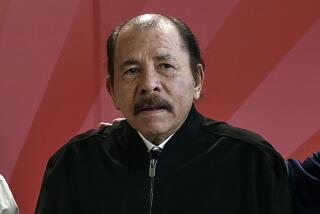Colombian activist waits in prison limbo
Community organizer Carmelo Agamez has spent five months in jail and still has not seen the evidence against him, been told who his accuser is or been notified of a trial date. Welcome to justice, Colombia style.
Facing what he says is a laughable charge of consorting with right-wing paramilitary leaders, the lifelong socialist says he has been thrown arbitrarily into the maw of Colombian justice.
In a jailhouse interview in northern Sucre state, Agamez said the real reason he was arrested was that he was organizing displaced Afro-Colombians in the town of San Onofre. That angered powerful interests trying to assemble abandoned lands for cattle, lumber and oil-drilling projects, he said.
“I was bringing social help to people who were asserting claims for their land and this caught someone’s attention,” Agamez, who heads the local chapter of the National Movement of Victims of Crimes of State, said Monday. “People who didn’t dare speak were starting to get rid of the fear they felt.”
Colombian prosecutors did not respond to a request for an interview.
Colombian and U.S. human rights organizations have rallied around the 60-year-old activist, saying he is an example of how community leaders here are sometimes jailed and charged with “rebellion” or “paramilitarism” to discredit them and intimidate others.
The arrests also illustrate the broader problem of weak rule of law in Colombia and elsewhere in Latin America, legal experts say. U.S. Embassy officials consider the creation of a stronger and fairer Colombian judicial system one of the keys to ending decades of civil strife.
Human Rights First of New York issued a report in February citing Agamez’s arrest as one of 32 questionable cases of Colombian activists jailed on what the group called flimsy charges -- such as inciting rebellion, terrorism or paramilitarism. The report says such charges often mask the real motive for the detentions: silencing dissident political voices.
One of the group’s attorneys, Andrew Hudson, said in an interview that his group had called on President Alvaro Uribe to have the prosecutor general’s human rights unit review “all criminal cases of human rights defenders” to vet cases for compliance with due process of the law.
Wrongful detentions are just one of several Colombian human rights issues being examined by Democratic members of the U.S. Congress with an eye toward making improved performance a condition of continued aid.
Other issues include the slayings of hundreds of Colombian labor leaders in recent years, as well as “false positives” -- the killing of civilians by soldiers and police officers who later say the victims were rebels killed in battle.
At a House Human Rights Commission hearing last week, co-chair Rep. Jim McGovern (D-Mass.) said arrests may be used by the Colombian government to “undermine the legitimacy of human rights work” there.
“Instead of bringing trumped-up charges against human rights defenders,” he said, “the Colombian government needs to do much more to support these organizations.”
Leaders on both ends of the political spectrum claim to be victims of Colombia’s broken judicial system. The family of former Sen. Carlos Garcia, a conservative backer of Uribe who was jailed in August based on questionable evidence that he consorted with right-wing paramilitary groups, says he is a “political prisoner.”
U.S. government officials and academics, even those who express admiration for Uribe’s success in restoring security to much of Colombia, say they are alarmed by his demonization of his leftist political opponents.
“One of the most serious weaknesses of [Uribe’s] highly regarded and successful Democratic security policy has been its systematic neglect of key elements of the rule of law and Uribe’s apparent disdain for human rights organizations in general,” said Bruce Bagley, a political scientist and Colombia expert at the University of Miami. “The Carmelo Agamez case raises these issues.”
Hundreds of people in several Colombian cities heeded a call last week from the Jose Alvear Restrepo Lawyers Collective of Bogota, a rights group, to demonstrate against Agamez’s jailing.
Agamez said that although his family and close supporters believe he is being held unjustly, his jailing has sown seeds of doubt among some followers, doubt that won’t be easily erased.
“That’s what these people want,” Agamez said, referring to those behind his imprisonment. “I feel impotent before that.”
More to Read
Start your day right
Sign up for Essential California for news, features and recommendations from the L.A. Times and beyond in your inbox six days a week.
You may occasionally receive promotional content from the Los Angeles Times.






